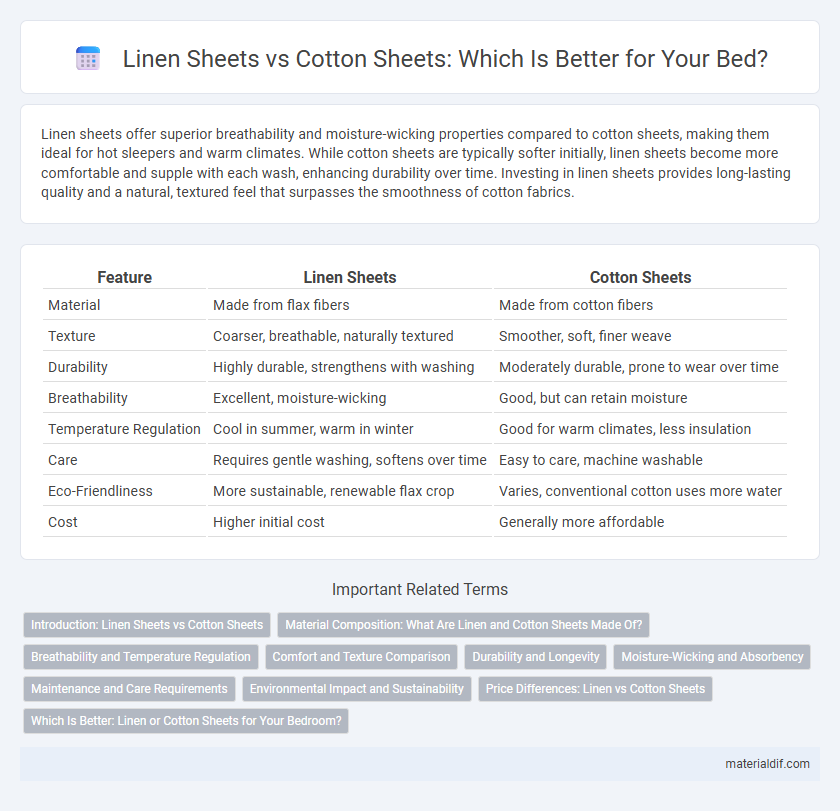Linen sheets offer superior breathability and moisture-wicking properties compared to cotton sheets, making them ideal for hot sleepers and warm climates. While cotton sheets are typically softer initially, linen sheets become more comfortable and supple with each wash, enhancing durability over time. Investing in linen sheets provides long-lasting quality and a natural, textured feel that surpasses the smoothness of cotton fabrics.
Table of Comparison
| Feature | Linen Sheets | Cotton Sheets |
|---|---|---|
| Material | Made from flax fibers | Made from cotton fibers |
| Texture | Coarser, breathable, naturally textured | Smoother, soft, finer weave |
| Durability | Highly durable, strengthens with washing | Moderately durable, prone to wear over time |
| Breathability | Excellent, moisture-wicking | Good, but can retain moisture |
| Temperature Regulation | Cool in summer, warm in winter | Good for warm climates, less insulation |
| Care | Requires gentle washing, softens over time | Easy to care, machine washable |
| Eco-Friendliness | More sustainable, renewable flax crop | Varies, conventional cotton uses more water |
| Cost | Higher initial cost | Generally more affordable |
Introduction: Linen Sheets vs Cotton Sheets
Linen sheets, crafted from flax fibers, offer exceptional breathability and durability compared to cotton sheets, which are made from cotton fibers and known for their softness and affordability. Linen's natural moisture-wicking properties make it ideal for hot sleepers, while cotton provides a smooth texture suitable for sensitive skin. Choosing between linen and cotton sheets depends on preferences for temperature regulation, longevity, and fabric feel.
Material Composition: What Are Linen and Cotton Sheets Made Of?
Linen sheets are crafted from fibers of the flax plant, known for their durability and breathability, making them ideal for hot climates. Cotton sheets derive from the cotton plant's soft fibers, offering a smooth texture and widespread versatility in various thread counts and weaves. The natural composition of linen ensures moisture-wicking and antimicrobial properties, while cotton provides softness and easy maintenance.
Breathability and Temperature Regulation
Linen sheets offer superior breathability compared to cotton sheets due to their loosely woven fibers that allow better air circulation and moisture-wicking properties. These characteristics enable linen to regulate temperature more effectively, keeping sleepers cool in hot weather and warm in cooler conditions. Cotton sheets, while soft, tend to retain more heat and moisture, making them less efficient for temperature regulation and airflow.
Comfort and Texture Comparison
Linen sheets offer a unique texture characterized by natural slubs and a slightly coarse feel that softens and becomes more comfortable with each wash, making them ideal for those who prefer breathable, moisture-wicking bedding. Cotton sheets, especially those made from long-staple varieties like Egyptian or Pima cotton, provide a smoother, silkier texture with a softer touch that many people find cozy against the skin. Linen excels in temperature regulation and durability, while cotton sheets typically have a plush softness and a gentle drape, influencing personal preferences for overall comfort and tactile sensation.
Durability and Longevity
Linen sheets are renowned for their exceptional durability, often lasting decades due to the strength of flax fibers, which resist wear and tear better than cotton. Cotton sheets, while soft and breathable, typically have a shorter lifespan, with frequent washing leading to faster fiber breakdown. Choosing linen over cotton results in longer-lasting bedding that maintains structural integrity and softness with age.
Moisture-Wicking and Absorbency
Linen sheets excel in moisture-wicking and absorbency due to flax fibers' natural ability to draw moisture away from the body, keeping sleepers cool and dry throughout the night. Cotton sheets, particularly those made from high-quality Egyptian or Pima cotton, offer good absorbency but typically retain more moisture than linen, which can lead to a heavier feel. The superior breathability and quick-drying properties of linen make it an ideal choice for hot or humid climates where moisture management is essential for comfort.
Maintenance and Care Requirements
Linen sheets require gentle washing in cool water with mild detergent and benefit from air drying to maintain their natural fibers and texture. Cotton sheets are generally more durable in higher temperatures and tolerate frequent machine washing and drying, making them easier to care for in busy households. Both fabrics improve softness with use, but linen's tendency to wrinkle demands occasional ironing, while cotton sheets remain relatively wrinkle-resistant.
Environmental Impact and Sustainability
Linen sheets are more sustainable than cotton sheets due to their lower water consumption and minimal pesticide use during flax cultivation. Linen fibers are biodegradable and have a longer lifespan, reducing waste compared to cotton, which requires intensive irrigation and often involves chemical fertilizers. The environmental impact of linen production is significantly lower, making it a preferred choice for eco-conscious consumers.
Price Differences: Linen vs Cotton Sheets
Linen sheets typically cost more than cotton sheets due to the labor-intensive process of harvesting and processing flax fibers, which results in a higher price point. Cotton sheets are generally more affordable and widely available, making them a budget-friendly choice for many consumers. The durability and breathability of linen justify its premium price, while cotton offers softness and ease of care at a lower cost.
Which Is Better: Linen or Cotton Sheets for Your Bedroom?
Linen sheets are highly breathable and moisture-wicking, making them ideal for hot sleepers and humid climates, while cotton sheets offer a softer, smoother texture that many find more comfortable for year-round use. Linen's durability and natural antibacterial properties provide long-lasting freshness compared to cotton, which may wear out faster but often feels gentler against sensitive skin. Choosing between linen and cotton sheets depends on personal preference for texture, climate needs, and desired longevity in bedroom linens.
Linen Sheets vs Cotton Sheets Infographic

 materialdif.com
materialdif.com